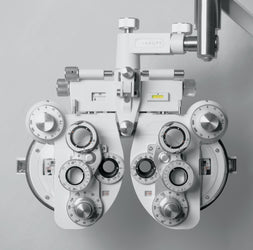Many people assume eye tests are only needed when vision becomes blurry or glasses feel out of date. The truth? Regular eye examinations are essential for everyone—whether your sight seems fine or not.
Eye tests not only check how clearly you see, but also detect early signs of eye disease and even wider health problems like diabetes and high blood pressure. Prevention is always better than cure, and timely checks can protect your sight for the long term.
Myth-Busting: How Often Should You Book?
Adults (16–59):
Myth: “I only need an eye test if something feels wrong.”
Fact: Adults should have an eye test every two years—even if your vision seems fine. Many conditions develop slowly and without symptoms.
Children (up to age 16):
Myth: “Children only need tests if they’re struggling at school.”
Fact: Children should have an annual eye test. Clear vision is essential for learning and confidence. NHS sight tests are free for under 16s and under 19s in full-time education.
Adults over 60:
Myth: “I can leave longer between appointments now I’m older.”
Fact: Older adults are at greater risk of glaucoma, cataracts and macular degeneration, so yearly eye tests are vital. The NHS provides free annual tests for over 60s.
If you have a family history or health condition: More frequent checks may be recommended. Conditions like diabetes can affect your eye health, making regular monitoring essential.

Why Regular Eye Tests Matter
 |
Early detection: Eye examinations can spot problems before you notice symptoms. |
 |
Overall health: Eyes can reveal signs of diabetes, high blood pressure, and even cholesterol. |
 |
Peace of mind: Knowing your eyes are healthy gives you confidence in everyday life. |
NHS Entitlement: Who Qualifies for Free Tests?
You may be eligible for a free NHS sight test if you are:
 |
Under 16, or under 19 in full-time education |

|
Aged 60 or over |

|
Diagnosed with diabetes or glaucoma |

|
Over 40 with a close relative who has glaucoma |

|
Receiving certain benefits or eligible for NHS vouchers |
These entitlements make regular testing accessible—so you don’t have to wait until something feels wrong.

The Bottom Line
Don’t wait until you’re squinting at small print or struggling to read road signs. Regular eye tests are about prevention, not reaction. Whether it’s keeping your child confident at school, protecting your vision at work, or staying independent later in life, proactive care makes all the difference.
Book your eye test today with Eye Emporium








